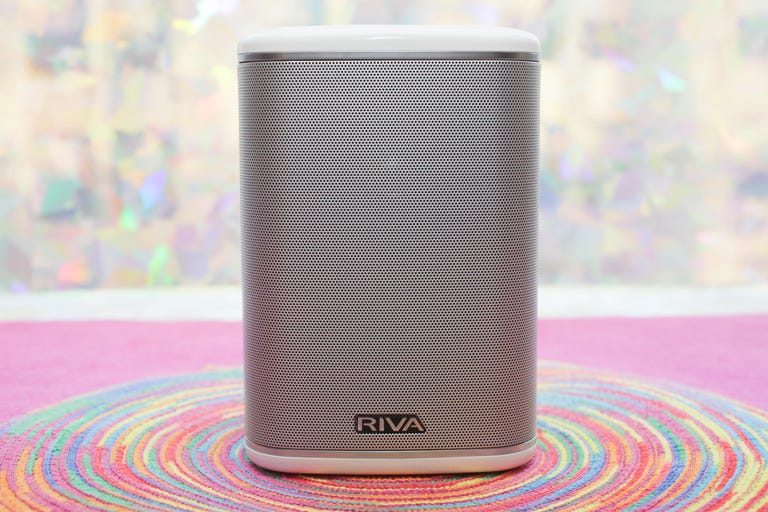 Why You Can Trust CNET
Why You Can Trust CNET Riva Audio Arena review: Take the show on the road
The Riva Arena is a likable Chromecast speaker that offers the option of portable use and is perfect for use in the bathroom or by the pool.
Bluetooth speakers are ubiquitous and cheap, but Wi-Fi speakers are generally better, with improved sound quality, range and stability. In addition to being more expensive than Bluetooth , one of the main reasons Wi-Fi still hasn't cracked the mainstream is a lack of battery-powered portability. Speakers like the Riva Arena are designed to address this.
The Good
The Bad
The Bottom Line
At $249/£225/AU$369, the Riva Arena offers the combination of a direct Wi-Fi connection to your phone and a portable battery when you're out of the home. It has a glut of connection options for playing music from your phone, including our favorite Wi-Fi ecosystem: Chromecast built-in. And yes, there's Bluetooth if you need it.
Competitors Sonos and Denon sound better, but you can't take them on the road. Right now if you want a portable Chromecast speaker, the Riva Arena is your best (and only) option.
Design-wise, the Riva Arena is two parts Sonos Play:1 and one part MP3 player. It's a 4-by-7-inch rectangular cuboid which comes in a choice of either white or black. It's larger and more solid feeling than the Sonos at 3 pounds (1.4kg) On the top of the unit is your control panel, which offers playback controls, volume and input selection (with a long press).
The splash-proof speaker is driven by a 50-watt amplifier which feeds three ADX drivers complemented by passive bass drivers. For a broader sound stage drivers are located in three of the four sides. There's no "sub" as such, but the accompanying Riva Wand app allows you to adjust the EQ.
The Riva doesn't have any alliances to particular Wi-Fi systems, setting it apart from locked-down devices such as Sonos or Bose's SoundTouch. It supports Chromecast built-in, Bluetooth, AirPlay and DLNA, and handles hi-res files such as FLAC, WAV and ALAC (24-bit/192kHz), as well as MP3 and WMA streaming. The Arena accepts a 3.5mm cable as well as USB and can even charge mobile devices with its portable battery.
The separate battery pack that actually makes it portable costs extra ($99/AU$159). It fits on the bottom of the Arena, enabling you to use the speaker anywhere. The attachment method isn't as elegant as the twist mechanism on the Denon HEOS 1 -- just a hook and a release button -- but it works fine (if you take off the protective sticker).
The optional battery costs $99/AU$159
First impressions of sound quality were good. The bass note that begins Alt-J's "3WW" wasn't overblown, especially compared to the Sonos Play:1, which made it sound a little more flatulent. But as the song progressed through the instrumental and vocal swells and dips, I began to prefer Sonos' superior dynamics. I also liked the Denon Heos 1, which made the music sound more focussed and present, better than the Riva.
In the Riva's favor it was able to pick out a little more midrange detail than the Sonos. The Arena offered more "air," albeit tempered by a tendency for chestiness, especially with female vocals. By comparison, the Sonos can sound a little "bone dry" which is better for accentuating vocals but lacks scope on lush orchestral pieces or similarly "large"-sounding music.
The Riva sounded more relaxed and more dispersed than the Denon or the Sonos regardless of the genre. Its soundstage was a little bigger than the cabinet suggested, but I was never tricked into believing I was listening to a dedicated stereo. If you want to do critical listening the Riva is not your speaker, this is definitely a background device.
Is the Riva a Sonos killer? Not quite. It does a lot of things the Sonos doesn't, such as Bluetooth and Chromecast support, but it just doesn't sound as good. Meanwhile the Heos is more elegant in its battery execution and yet its Wi-Fi ecosystem is more limited than the Riva's Chromecast. The Riva Arena is a promising first step into the future of Wi-Fi hi-fi, but in the end I'd still rather listen to the Sonos.


